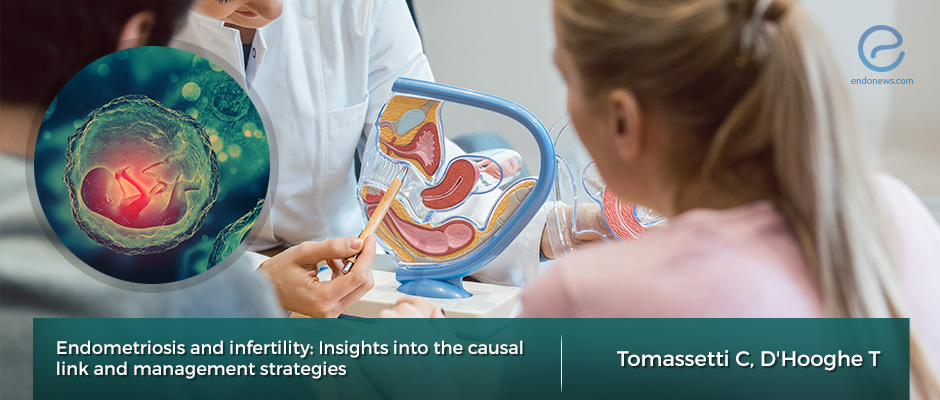Infertility in women with endometriosis
Jul 23, 2019
Endometriosis is a chronic disease which has a well-established association with infertility involving multifactorial reasons such as molecular, genetics, mechanical, and environmental causes.
Key Points
Highlights:
- Although the causal relationship between endometriosis and infertility has not been exactly clarified, potential factors of endometriosis-associated infertility have been proposed.
Importance:
- Understanding the causal link between endometriosis and infertility will improve the treatment strategies including expectant management, medical-surgical treatment, and medically assisted reproduction (MAR).
What’s done here?
- This review summarizes proposed mechanisms regarding how endometriosis adversely impacts fertility and discuss the available treatment options.
- Due to ethical considerations, human studies on this subject are limited.
- Information to explain this causal relationship is often obtained from animal experiments, especially from experiments carried out on baboons because of similarity to humans.
Key results:
- The relationship between endometriosis and infertility which is more than a simple association should be evaluated in many aspects.
- The type and quality of the association between endometriosis and infertility should be examined.
- Prospective baboon studies about spontaneous conception have shown that there was no difference between patients with minimal/mild endometriosis and women with unexplained infertility regarding the cumulative pregnancy rates and monthly fecundity rate; the data of the outcomes in women with moderate/severe endometriosis is limited.
- Minimal and mild endometriosis has a negative effect on the success of IUI, but data is insufficient concerning severe endometriosis.
- Endometriosis reduces the success of ART regardless of the stage according to revised American Society for Reproductive Medicine staging system.
- The temporal relationship between duration and the severity of endometriosis & infertility should also be evaluated.
- Thirdly, the dose-response gradient should be investigated. Minimal to mild disease have a less negative effect on fertility outcomes than moderate to severe endometriosis.
- Fourthly, the causal link between endometriosis and infertility should also be examined through biological aspects.
- The usefulness of laparoscopic surgery needs to be evaluated. Removal of all lesions during laparoscopy improves future fertility outcomes.
- Clinical management of endometriosis includes several different methods: expectant management, medical or surgical treatment, MAR including IUI and ART. It should be noted that medical treatment does not provide benefit for the improvement of endometriosis-associated infertility.
- Endometriosis Fertility Index (EFI) scoring should be the preferred method to determine postoperative reproductive success.
Lay Summary
Endometriosis is an estrogen-dependent gynecological disease mostly encountered in reproductive-aged women. The most common presenting complaints are dysmenorrhea, dyspareunia, chronic pelvic pain, and infertility.
Despite extensive research, the etiopathogenic mechanism underlying the two has not been fully elucidated. Although human experiments are limited for ethical reasons, animal experiments have shown that there is a causal relationship between endometriosis and infertility.
This association between endometriosis and infertility seem to be multifactorial, including mechanical, molecular, genetics, and environmental aspects. Pelvic cavity factors, ovarian factors, uterine/endometrial factors, and genetic factors are possible biological explanations for the development of endometriosis-associated infertility.
Tomasetti et al, a group of scientists from Belgium and Germany, published a review titled as “Endometriosis and infertility: Insights into the causal link and management strategies” in the journal named as Best Practice & Research Clinical Obstetrics and Gynaecology.
The authors aimed to review the causes of endometriosis-associated infertility. They also summarized guidelines such as the European Society of Human Reproduction and Embryology (ESHRE) guideline which included recommendations for the management of endometriosis-related infertility. Clinical management of endometriosis includes several different methods: expectant management, medical treatment, surgical treatment, and MAR including IUI and ART.
However, it should be known that medical treatment strategies do not provide benefit for the improvement of endometriosis-associated infertility, because all currently available methods suppress ovarian function. Thus, they should not be recommended to women who desire to be pregnant.
Surgical removal of all visible endometriotic lesions is effective especially in women with more extensive forms of endometriosis. EFI scoring system rather than rASRM scoring system should be the preferred method for predicting postoperative reproductive outcomes.
EFI includes several parts: patient characteristics (age, duration of infertility, history of pregnancy; parts of the rASRM staging, the end-of-surgery qualitative visual assessment by the surgeon of the adnexal function, which is the most important contributor to the predictive ability of the EFI. Another alternative to improve reproductive outcomes in women having endometriosis-associated infertility is MAR including “in vivo” conception with IUI and “in vitro” conception with ART such as IVF or ICSI. The optimal method for treatment of endometriosis-associated infertility should be patient-centered.
“Next to surgical treatment of endometriosis lesions, expectant management, MAR treatments such as IUI and ART such as IVF are cornerstones of the management of endometriosis-related infertility. However, it is not always clear which patient would benefit from which type of approach,” they added.
Research Source: https://www.ncbi.nlm.nih.gov/pubmed/30245115
endometriosis infertility revised American Society for Reproductive Medicine (rASRM) Endometriosis Fertility Index (EFI) the European Society of Human Reproduction and Embryology (ESHRE) guideline intrauterine insemination (IUI) assisted reproductive technologies (ART) medically assisted reproduction (MAR)

